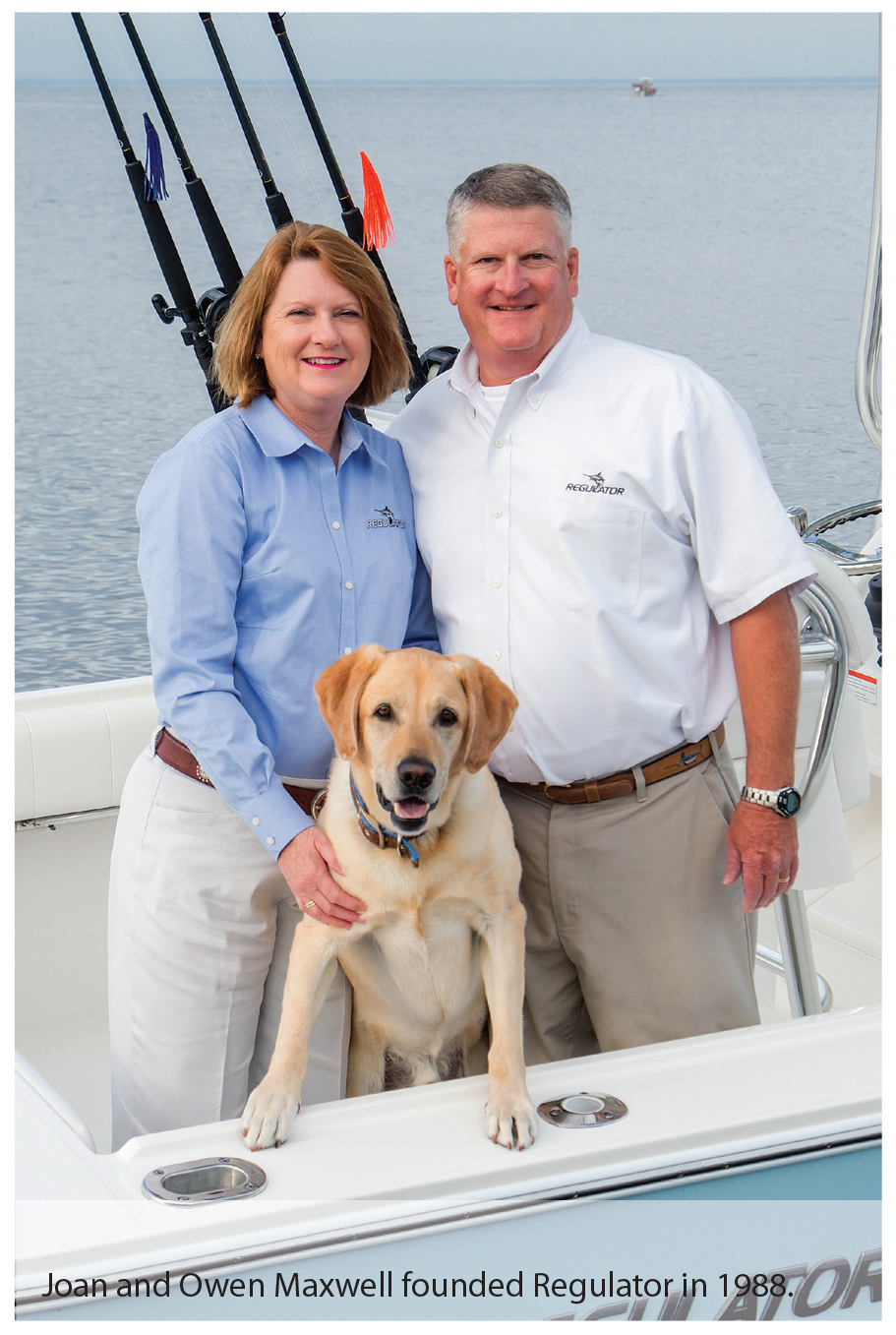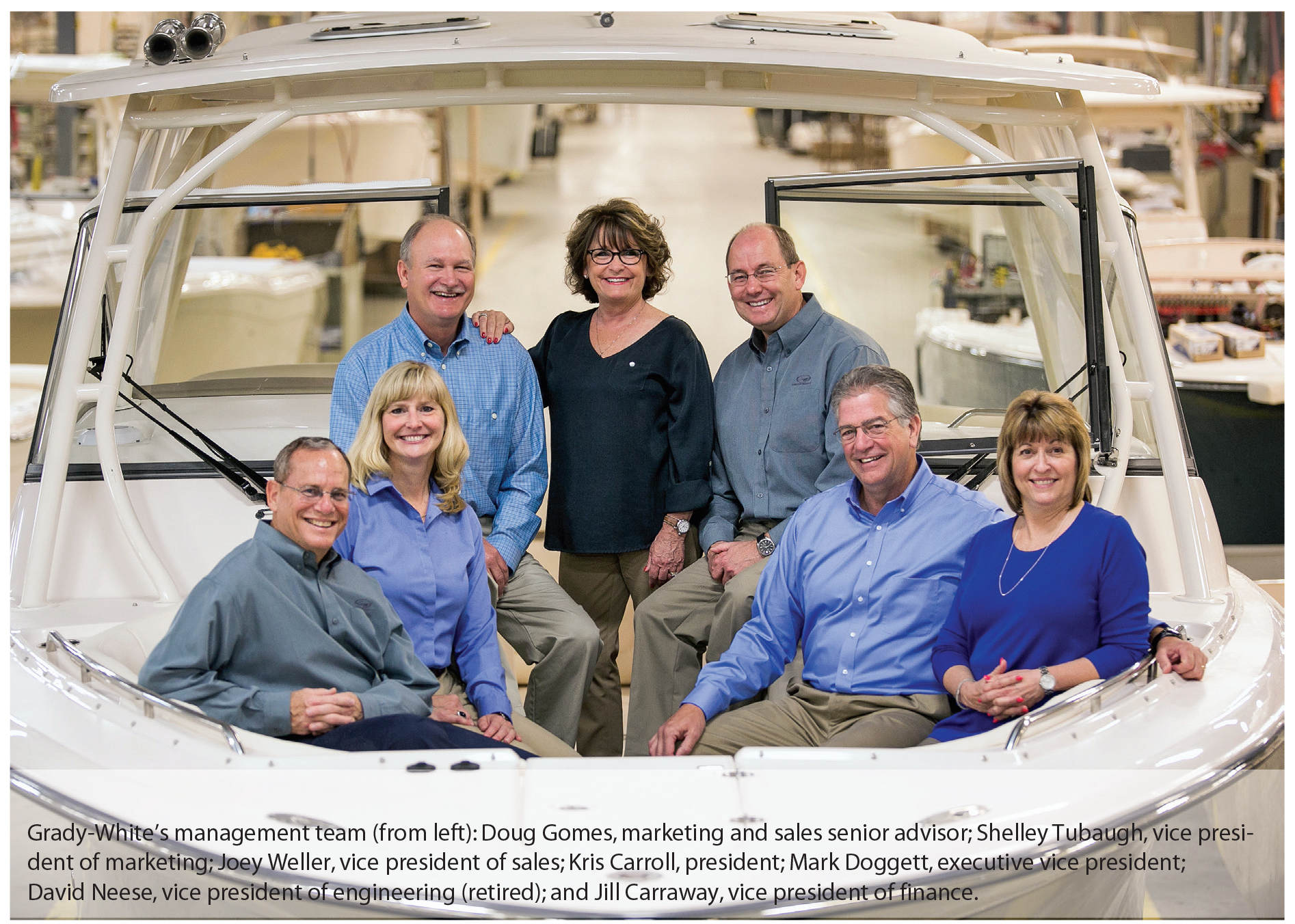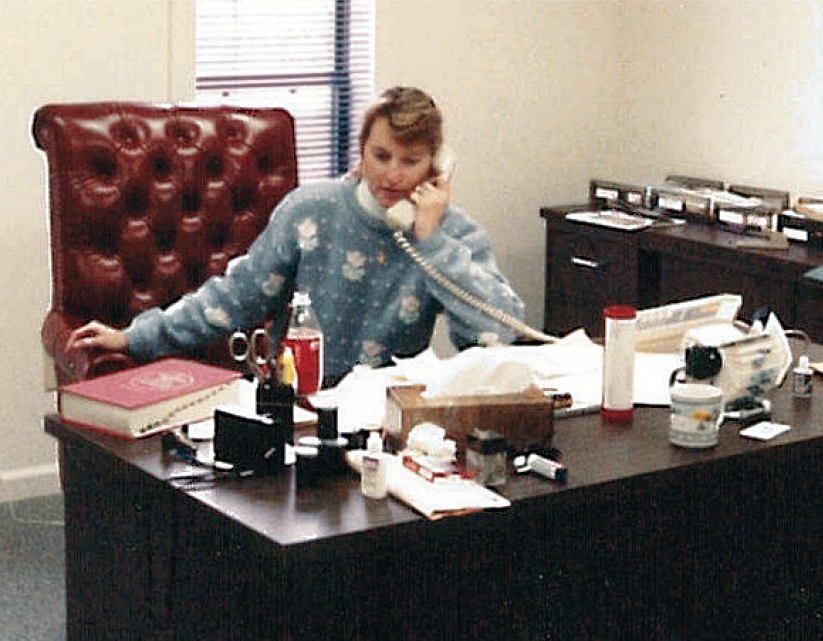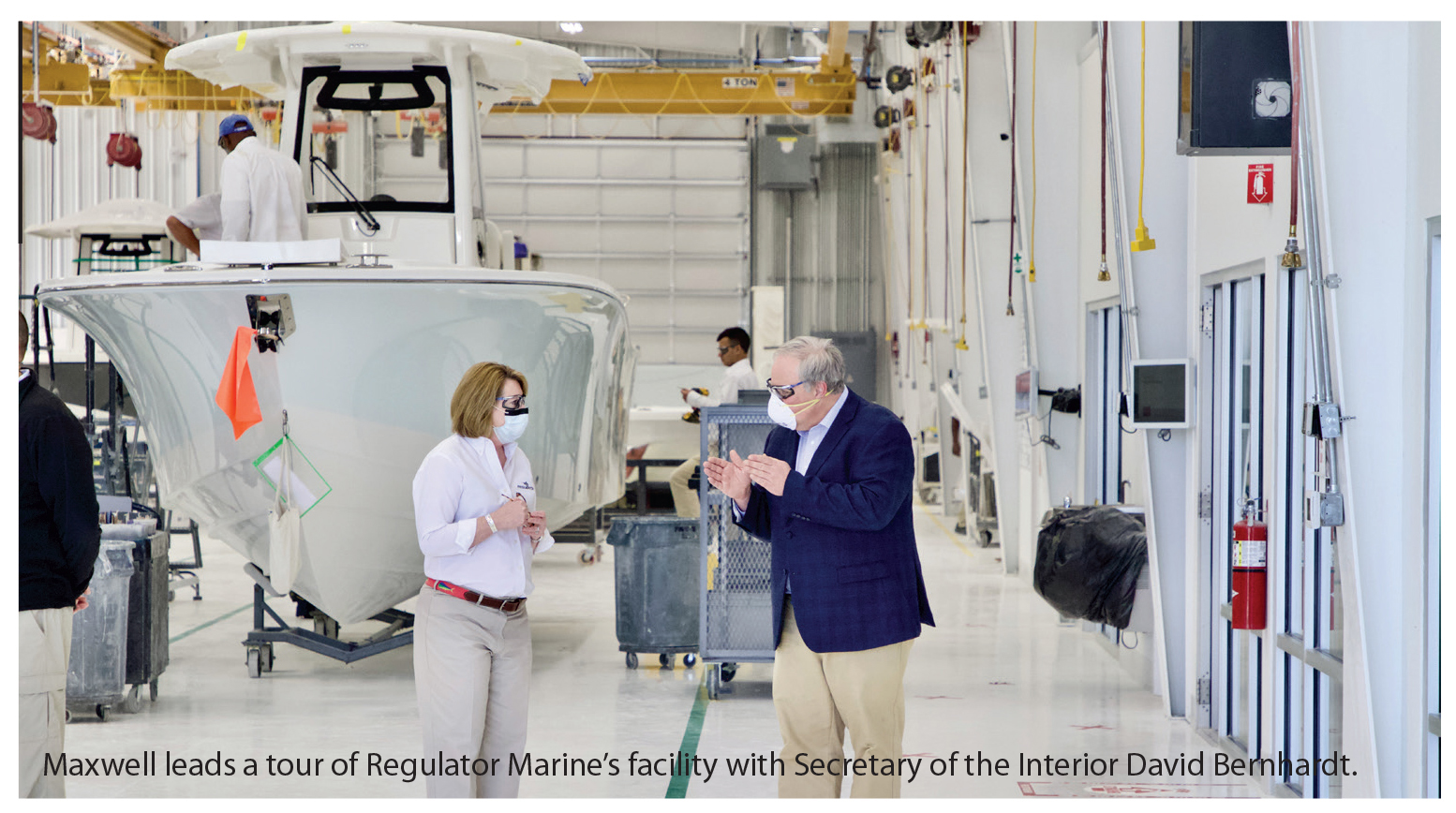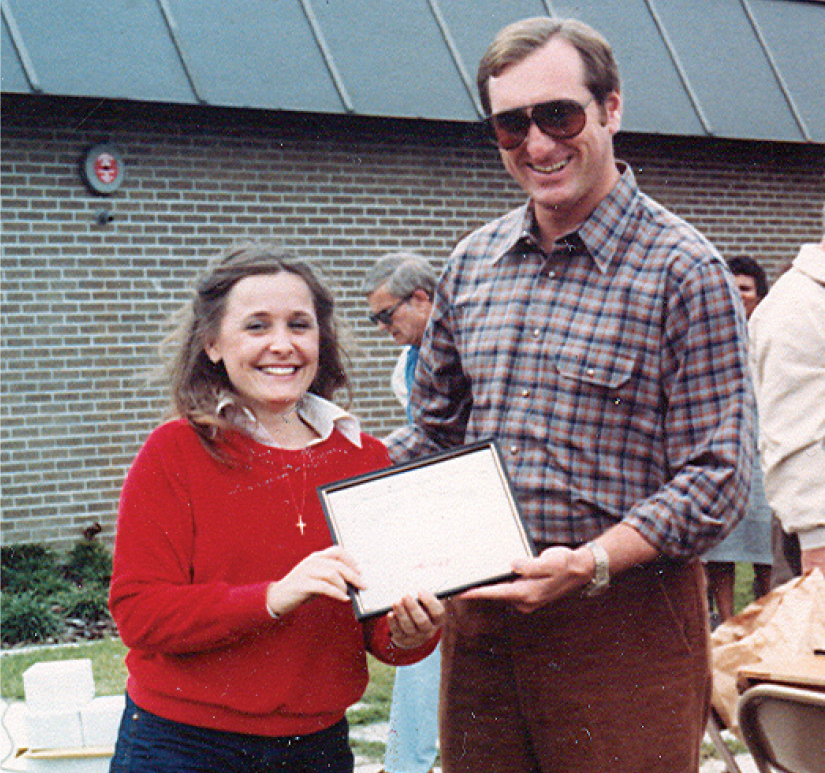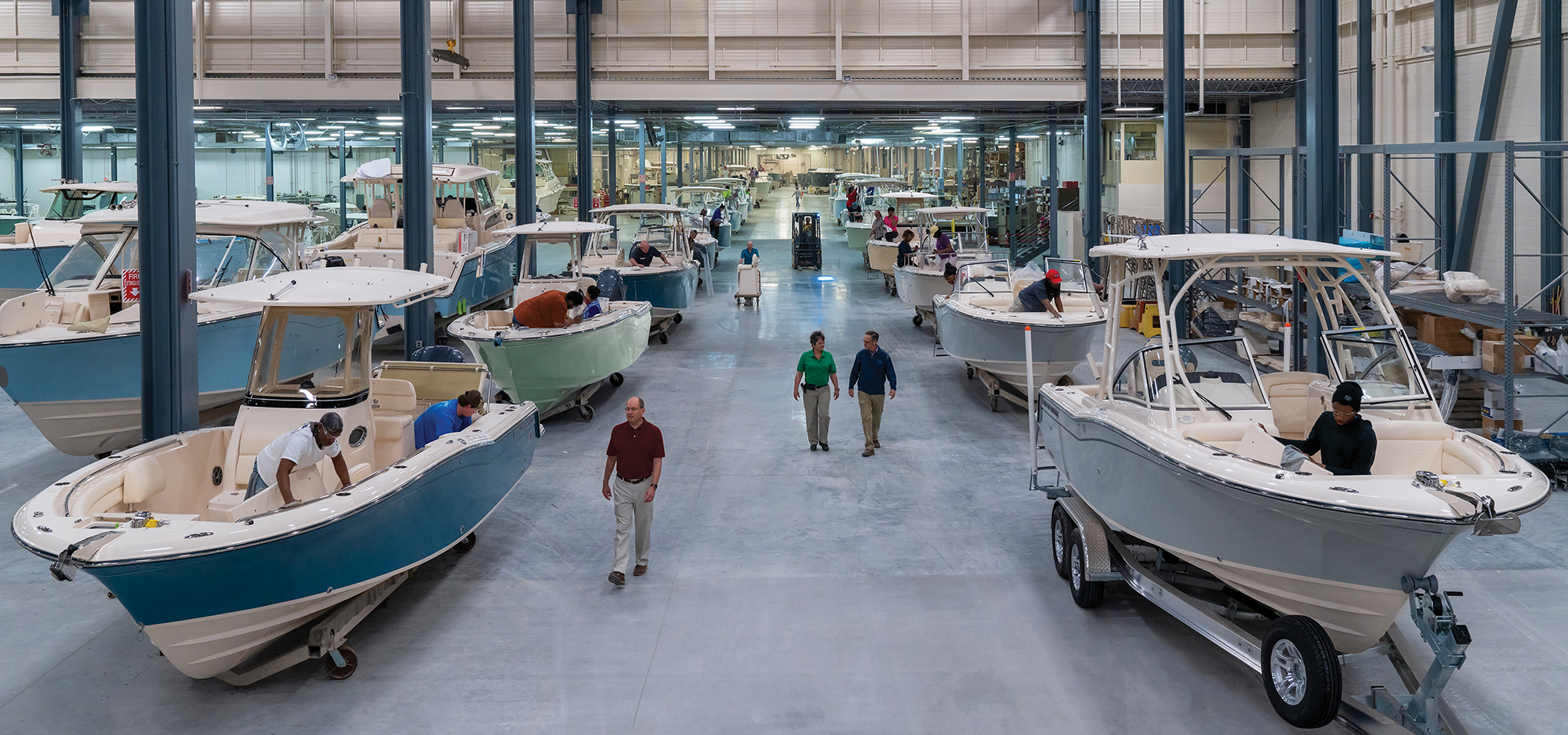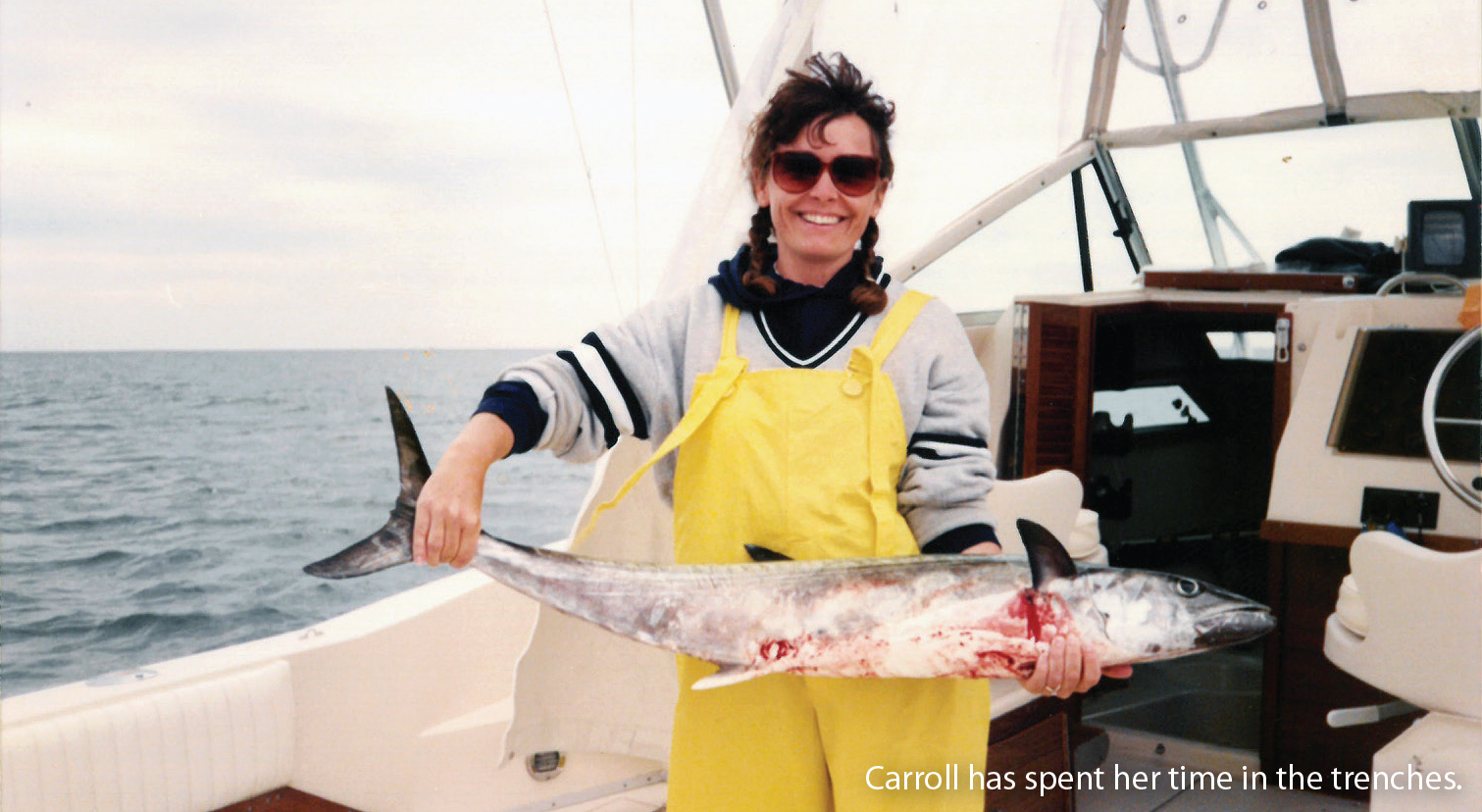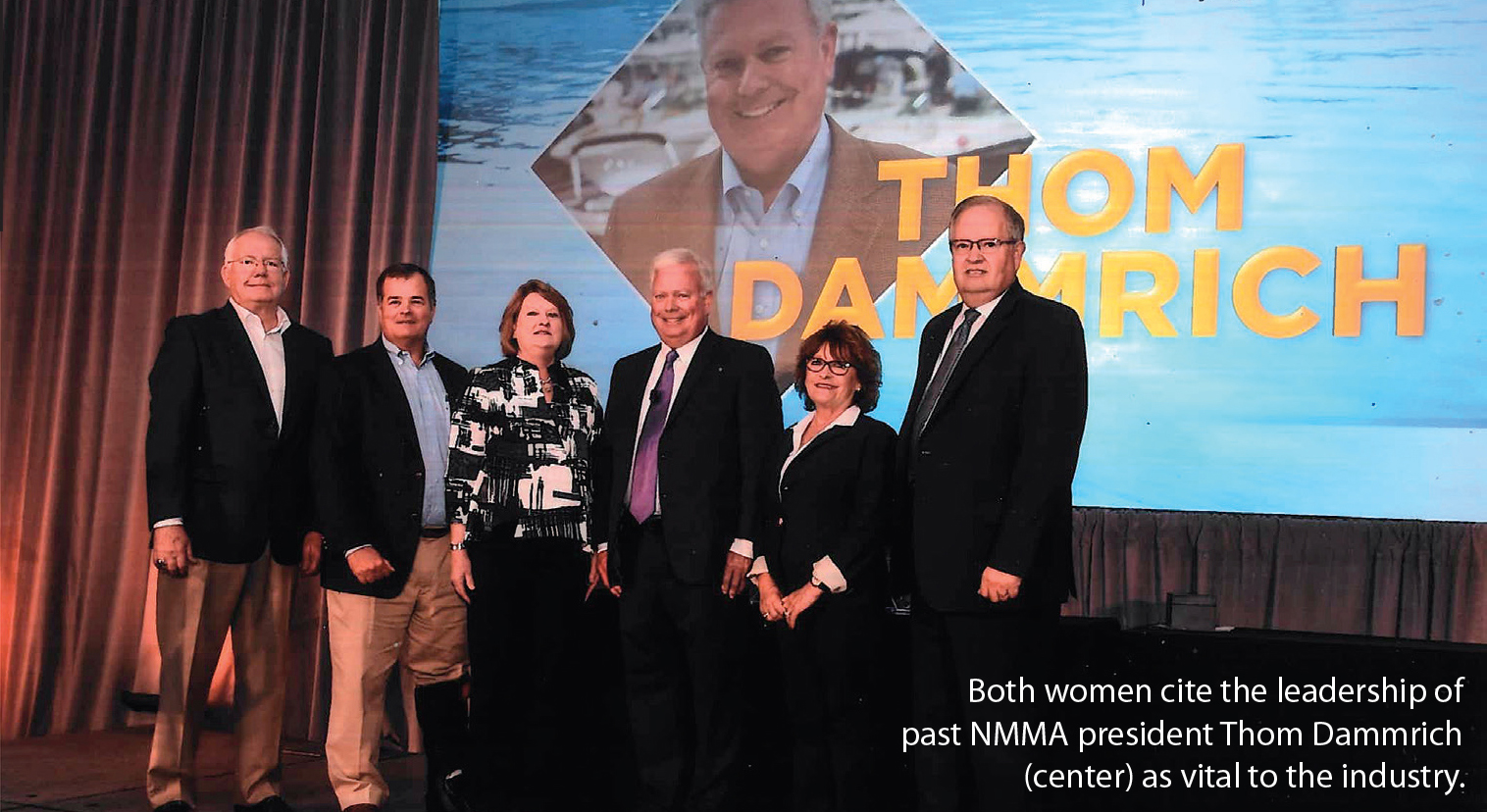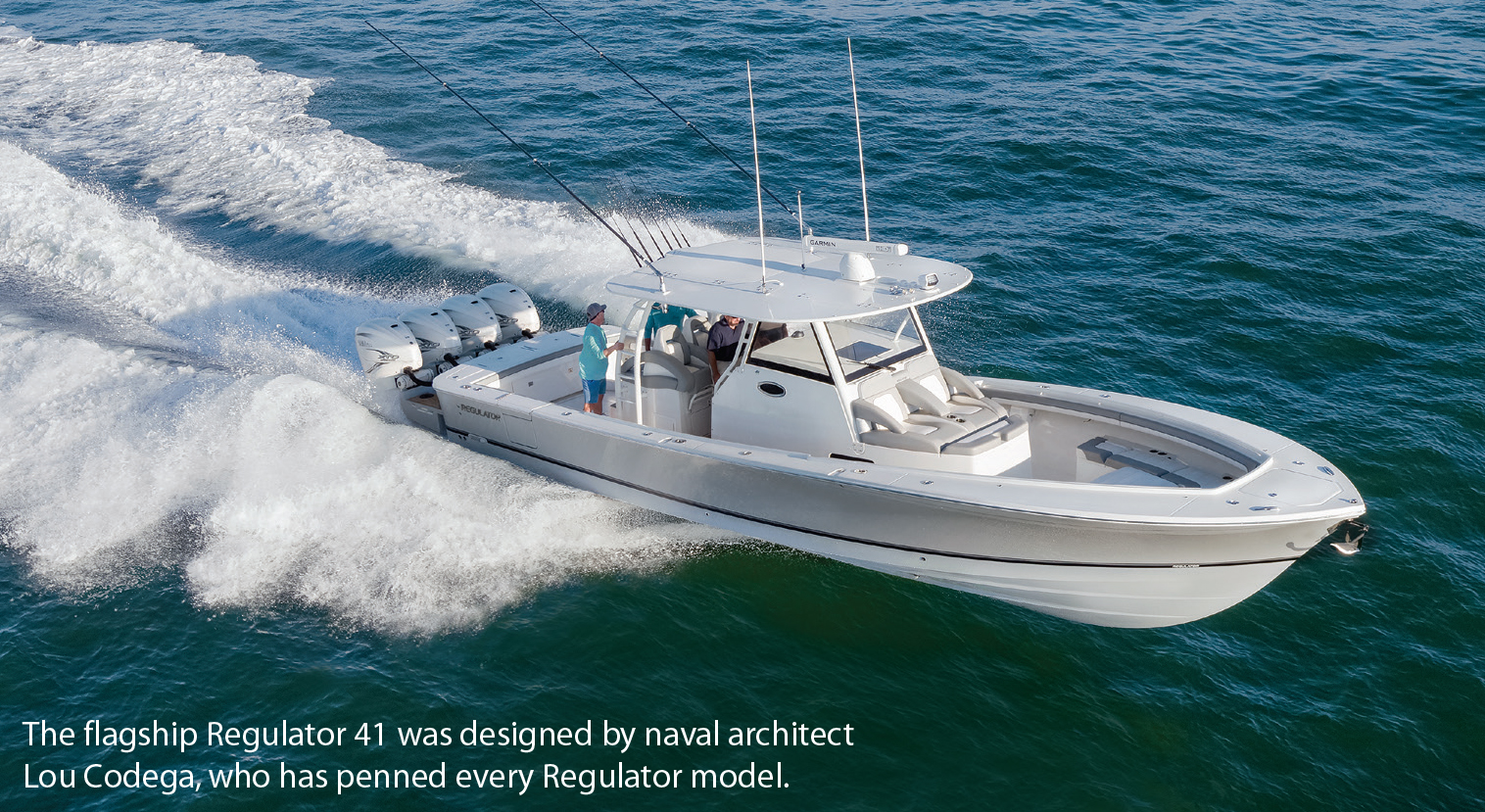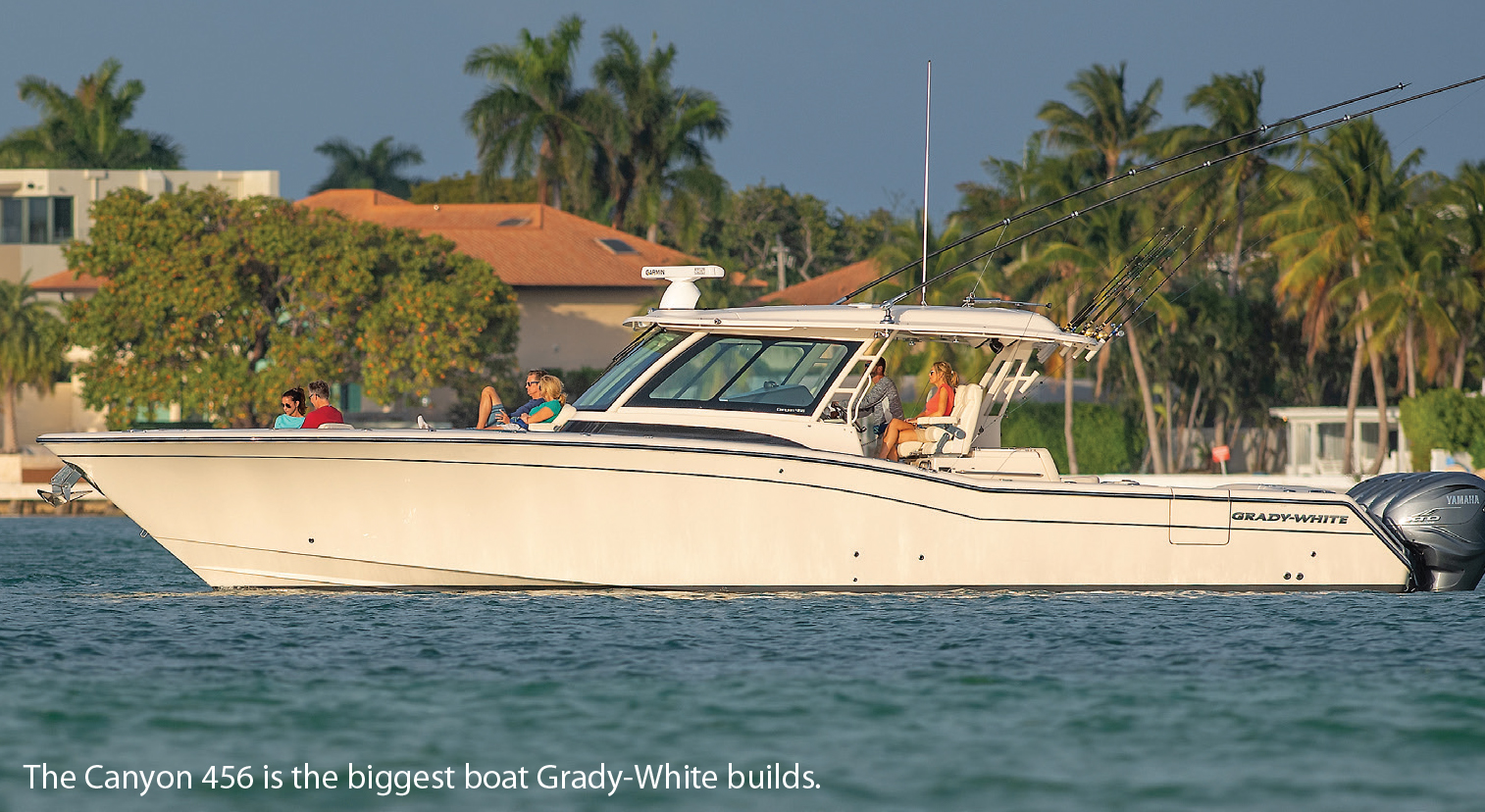News
All Articles
Company
Industry
Products
Conservation
Fishing
Grady-White Fanatics
All Years
2025
2024
2023
2022
2021
2020
2019
2018
2015
Q&A Joan Maxwell and Kris Carroll, of Regulator and Grady-White.

In a business dominated by men in positions of leadership, Joan Maxwell and Kris Carroll have found ways to rise to the top. Maxwell is president of Regulator Marine, the North Carolina builder she co-founded with her husband, Owen, in 1988. She has since helped to reinvent the center console, overseeing the launch of the iconic Regulator 26 and growing the company’s lineup to what it is today, with bigger models such as the Regulator 41 and the new XO series of center console crossovers.
Carroll is president of Grady-White Boats, which she joined in 1975. She worked her way up through multiple departments, including engineering, information systems and accounting. She became president in 1993 and has been an engaged board member for organizations including the National Marine Manufacturers Association. She also has spent dozens of years lobbying lawmakers on issues that are vital to boating.
Maxwell’s father, a forest ranger, had a “little 17-foot wooden boat that had a well in it that the outboard motor was mounted on. He pulled a shrimp net from it,” she says. Carroll grew up in Framingham, Mass.
“Summers, I would boat and fish with my dad on an old converted lobster boat out of Marblehead,” she says. “We often spent the first part of the summer scraping and repainting that old boat and then would have a few weeks left in the season to actually fish and cruise.”
Maxwell and Carroll were recipients of the 2018 Hammond Marine Industry Leadership Award from the Foundation for Recreational Boating Safety, Education and Environmental Awareness. They were honored for their service and commitment to advocacy on behalf of the boating industry.
What were some of your initial challenges as a woman in the marine industry?
JM: Simply overcoming the stigma that a woman may actually know the answer to the question. Overcoming that meant as it means today: just learn, be the expert and speak with authority.
KC: I never really have felt being a woman, in itself, was particularly all that challenging. I’ve always had a passion for doing every job as efficiently and effectively as possible. So my energy and focus is on getting the job done well, which never leaves much time to think about being a woman around a lot of guys. On a fun note, back in the early ’80s, I was the first and only woman on the NMMA Technical Committee. When attending the yearly certification conference, there were always about 150 men … and me. I guess, in that venue, I was a little more aware of being a bit different than the rest of the guys.
Joan, tell me about the early days of building the Regulator brand.
Building the brand was based on the same things we focus on today at Regulator: ride and fit and finish. Getting that message out there on a shoestring budget was the challenge. We did what we called a “tow and show,” where we would take the Regulator 26 to a potential dealer’s location and try to get him to take on the line. Sort of tough to talk about a line when there was only one model.
Finally, we figured out that we didn’t need the boat behind a pickup to get the name out there. So off on the road I went with brochures and sales materials. We were 28 and 30 years old when we started Regulator, young and naïve enough to believe we could do this. Along the way, we met some incredible people who have become lifelong friends — magazine writers, publishers, dealers and former dealers, many of them eating dinner with us at our home here in Edenton.
The Regulator 26 — really the model that Regulator built its reputation around — was introduced in 1990, when the boating industry was experiencing a slight recession and not a lot of new products were being introduced. So Regulator got a lot of press. That created awareness, but it was the experience on the boat that cemented Regulator’s reputation.
What had you done before starting Regulator that prepared you for what was to come?
Owen and I are the most unlikely boatbuilders. He has a degree in agriculture from the University of Georgia, and I have a degree in history from UNC-Chapel Hill. When I met Owen, he was managing a farm, and I was working at a government office where he “had” to come frequently to register crops. After we married, he joined a local boat company as a partner, and I worked for Historic Edenton giving tours, and worked at a small retail shop.
In 1988, what had been a dream for Owen of building a center console was born. Through both of our efforts, a boat became a company to manufacture boats. Through the years our roles have changed. Today, Owen’s focus is solely on design and engineering, and mine is on running every other aspect of the company. Who says a liberal arts education is not worth anything?
Kris, how did you get started, and what path took you to your current role as president?
At 24 years of age, I “ran away from home,” following a friend to Greenville, N.C. The first order of business was to get a job so I could eat. I ended up at the boat factory after four interviews, because they were concerned that I might be a short-timer as the production control clerk. I worked closely with the production supervisors and would spend a lot of time out in the factory to better understand the processes and flows, learning everything I could to help me do my best job.
Fortunately, [general manager] Wiley Corbett transferred me to clerk in engineering, and over the next 13 years, I had the opportunity to progress through numerous roles and opportunities, becoming vice president of engineering in 1987. At that time, I was also responsible for accounting and IT. In 1989, I was given the additional opportunity to lead manufacturing, which allowed me to better integrate engineering and manufacturing. In 1992, I was promoted to executive vice president and general manager, and I was given the opportunity to be president in 1993.
Regulator has thrived in North Carolina. Joan, what has the experience of building your company been like?
Edenton is a great, small, rural town of 5,000 people that had been home to several boat manufacturing plants. There were many skilled craftsmen who knew how to build boats. Owen is very technical, but he did not know the finer points of building, especially the technical/chemical side of lamination. These legacy builders taught the young whippersnapper and the new hires the boatbuilding skills. As this population of boatbuilding craftsmen aged out, Regulator has built on their tribal knowledge and developed processes to ensure quality builds.
Edenton is a small town, and not everyone is cut out to live here, so finding exceptionally talented engineers and executives willing to move here has been a challenge that we have embraced. We undertake any search with the understanding that it may take longer than we would like to find our ideal candidate. Regulator’s impact on the community can be far-reaching, from offering an opportunity for staff members to volunteer at schools or with local charities — all while being paid to do so — to financially supporting local charities like the food pantry and the Boys & Girls Club.
Kris, Grady-White has also grown tremendously in North Carolina.
Eddie Smith bought the company in 1968 and chose to remain here because he fell in love with the area, all of its natural resources, and the work ethic of the wonderful team of people working at Grady-White. The Pitt-Greenville community has been a terrific partner with Grady-White over the years. The state of North Carolina, through its development programs, has also been very helpful to Grady-White’s success.
Both of you have seen your companies through enormous changes and business-cycle swings. What event has had the most impact?
JM: The Great Recession taught us the value of being debt-free and how critical it is to “right size” the business quickly when a business cycle starts to decline and to rebound.
KC: The Great Recession of 2008 tops them all, with a long 10 years of recovery. In many ways, it took us back to the strategies of the ’70s, when we were in survival mode. Being lean has always been a foundational principle for us, but one of Eddie’s favorite quotes is, “The seeds of destruction are sown in good times.” When we encounter the down-turns, we always find opportunities to get back to basics.
What has been your biggest challenge?
JM: With a growing market, our facility was not large enough to meet the demand. We made the decision to expand, and Regulator is positioned well for minimum of five years. The marketplace has more center console manufacturers than ever before, so making sure that every Regulator lives up to its promise of quality, fit, finish and ride. That means that our engineering team must be constantly working on new and innovative designs, while our manufacturing team executes to our quality promise.
KC: The biggest challenge for our team is to maintain our edge. We have been very successful in all measurements of business. To stay in our prime, we must push ourselves to evolve, refine and innovate.
Tell us about your roles as mentors. What advice do you give to women entering the business?
JM: I am currently mentoring a young manufacturing supervisor. I think I am learning as much as she is, as I reread The 7 Habits of Highly Effective People with her. The advice that I share with her would be what I would share with any woman or man: Learn all that you can. Do all that you can. Do not complain about something. And be proactive; figure out how to solve the problem by using your technical knowledge and seeking out advice from others.
KC: My best advice is, learn everything you can, and learn from the best. Working for Wiley Corbett the first 18 years of my career taught me what it takes to build high-quality boats efficiently, and how to design and engineer boats that will delight our customers.
Eddie Smith taught me principles and values of exceptional sales, marketing and branding, the basis of which is to always exceed your customer’s expectations. Dr. Gerald Bell from the Bell Leadership Institute in Chapel Hill taught me about team building and strategic planning. We have an exceptional leadership team at GW, and we are always learning from one another. And then there are those hundreds of great authors that have taught me lots of other stuff.
Both of you are seen as trailblazers in the industry. How do you accept and nurture that role?
JM: Trailblazers usually have the arrows in their backs. Just kidding. I really do not see myself in that role. I do see Kris in that role, and she has been a great mentor, encourager and friend to me. She shares wisdom born of knowledge and experience with me. Whenever I have a question, I always feel that I can call her. To me, her selflessness is how she nurtures her role, making herself available.
KC: In Ecclesiastes, it is written, “Eat, drink and enjoy the work you do, which is a gift from God.” I believe everyone is given a gift to give to the world. Understanding your gift, and committing to mastering that gift, will bring you the greatest success and enjoyment.
What keeps you driven? What keeps you grounded?
JM: The desire to make the process and the end products — a great boat for our amazing customers — better. My faith and the love of a great man.
KC: At the end of Ecclesiastes, it is written that a successful life is based on loving God, and loving our neighbor as ourselves. There is always an endless stream of neighbors to love. Life is a journey, not a destination, and it is my desire to continue to “pay it forward” and enjoy the journey.
What are some takeaways from your time in the marine industry?
JM: This industry is made up of people who often start out in this business because they love boating. It does not necessarily start out as a career, but when it gets in their blood, it becomes one. As manufacturers, we may come to market as competitors, but when we sit around the NMMA board table, we make decisions for the good of the industry, and at the end of the day we can sit down over dinner as friends.
KC: The marine industry provides so many people enjoyment and happiness in their lives. How special is that? We can accomplish anything when we work together. I have met so many terrific people in this industry, like my good friend Joan Maxwell. Our customers, dealers, suppliers and our team are my family and my friends.
As presidents, what do you think are the most important roles that you have as leaders?
JM: The most important role that I have is to maintain the culture of Regulator, which means empowering people at every level of the company to understand and live out Regulator’s mission, core values and commitment to our customers to deliver the best center console sportfishing boats.
KC: My responsibility is to keep our business focused on working together with all our team, internal and external, to deliver the ultimate boating experience to our customers while enjoying our work, every day.
What actions or programs have had the most impact?
JM: Daily board meetings throughout the entire plant that focus on our mission, values, safety, quality, delivery and productivity. Being transparent with our team — sharing with them both the glowing and, at times, not so glowing responses from our customers. Also, our EOS, or Entrepreneurial Operating System, is a way that we set our annual and quarterly goals and meet weekly in groups throughout the plant to report our progress as well as bring any issues to the group. We are only about nine months into this, and the traction has been better than I imagined. Our executive team has told me they believe it is one of the best things I have done for the company.
KC: We have a very strong book-reading program here at Grady-White, where we pay people to read books. A few are mandatory, but there are 19 on the list and more to come. As a team, they help us “read from the same page,” providing a common language and alignment. Although somewhat presently modified because of Covid, for years we have had weekly, 20-minute Friday morning updates, where the entire plant meets together to hear what’s happening, be inspired to be our best and just have a little fun together.
What other leaders in the marine industry do you admire, and why?
JM: Pioneers like Leon Slikkers of Pursuit and Tiara, Pack St. Clair at Cobalt and Eddie Smith, who created great brands and developed multigenerational companies. Also, Thom Dammrich, who took a very disjointed and, some may say, dysfunctional marine industry and pulled it together, creating one united voice [at the NMMA]. Scott Deal, who leveraged his love for fishing and his intellectual prowess to not only build three great brands, but helped push legislators to protect and preserve the fishery. Also, Ben Speciale; as president of Yamaha Marine, he has used the great influence of his brand to draw attention to and influence the outcome of laws that impact fishery issues. And Owen Maxwell, for his desire to build the best center console sportfishing boat for over 30 years.
KC: Obviously, my boss Eddie Smith, for all the reasons mentioned above. And our incredible leadership team at Grady-White. Thom Dammrich is the most level-headed, thoughtful leader, committed to a win for everyone. Joan Maxwell teaches me grace. Ben Speciale teaches me strategy. And boatbuilders like Scott Deal of Maverick Boats, Joe Neber at Contender, Joan and Owen Maxwell and so many others I would like to name (but the list would be too long for this article) who are self-starting, scrappy and tough entrepreneurs who have taken great personal risk to follow their dreams and to make our industry great.
Both of you are active with boating advocacy. What do you think the industry has done well, and where do we need the most work?
JM: Through the advocacy of many in our industry, the passage of the Great American Outdoors Act. We need to remain vigilant in protecting fishing access. Shorter fishing seasons with smaller limits could result in less boat sales. Our goal is to protect the future of the fishery tomorrow while using it responsibly today.
KC: We are certainly all grateful for the recent passage of the Great American Outdoors Act, which dedicates funding for recreational infrastructure and conservation, and there have been many others in the six decades Grady-White has been involved in conservation and advocacy. Everything from the Boating Safety Act, Sportfish Restoration and Boating Trust Fund, and Modern Fish Act have been great legislative accomplishments this industry can be proud of. I would encourage everyone to get involved in advocacy by attending the American Boating Congress, participating in BoatPAC, or hosting an elected official at your facility. The more you engage in advocacy, it will pay back to you, your company, and all boating and fishing enthusiasts in dividends.
Where do you see the industry headed?
JM: The next year is going to be one of growth. With the decrease in production in the spring due to Covid-19’s impact on plant closures and the increase in social distancing on a boat, inventory levels are already lower than recent history, so I believe we will see both wholesale and [retail] growth. Whether boat shows will be a selling and showing platform remains to be seen. I do think that customers will expect shorter time from order to delivery. As for products, customers will have less time to learn how to become the best helmsman, so the learning curve is going to be shortened by the technological advancements of every aspect of the vessel, from propulsion to navigation to plumbing and electrical systems.
KC: I am planning to take the greatest advantage of the current momentum while preparing for the next dip, whether it be next month, next year or five years from now. I believe we should all be ready with Plan A, Plan B and maybe a few more plans so that we can quickly adjust and continue to thrive for decades to come.
How have the cancellations of major boat shows affected business?
JM: We have not yet felt the impact of the cancellations on the retail side of the business. We traditionally do not sell a very high percentage of our annual production at the shows. Due to the size of the purchase, these decisions are typically made months after the shows. So the question is whether sales will be delayed or completely lost without the shows. I see it as an opportunity for our sales, marketing, P.R. team and dealers to get more creative in finding ways to get consumers into our Regulator dealerships, to see and experience the Regulator fit, finish and ride.
KC: We have all seen a major uptick in online traffic. Our website is already a terrific silent salesman, with loads of information and content for our customers and prospective customers. Dealers also are experiencing terrific levels of interest and are doing more digitally, as well. We are partnering with them to be sure they have all the resources they need to sell, with or without the traditional shows.
Are there any exciting plans for Regulator and Grady-White?
JM: Our engineering team is always working on ways to improve our current offerings and developing new products, the latest of which was targeted for a Miami 2021 introduction. Due to the impact of Covid-19, we slowed development on this model and restarted it in June, with same goal of introduction at the 2021 Miami show. Our engineers say it will be close, and I have confidence they will indeed have the boat ready for Miami.
KC: We always have new, exciting products coming down the line. We have two that will come to market next year, but I can’t talk about those yet.
Finally, what are some of your favorite places to go boating?
JM: Of course, the beautiful Outer Banks, especially in, around and out of Oregon Inlet. My favorite type of fishing is billfishing in Costa Rica.
KC: I’ve been lucky enough to boat and fish on Grady-White boats in many places around the U.S. All of them offer experiences that are beautiful and unique, but eastern North Carolina has been my home for a long time, and I love what it has to offer. The Pamlico River is lovely year round, and a nice trip is from Bath over to Ocracoke. Or, passage through the Intracoastal Waterway to Oriental and on to New Bern is delightful.
